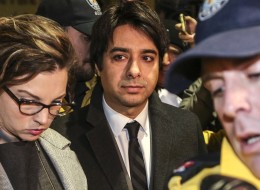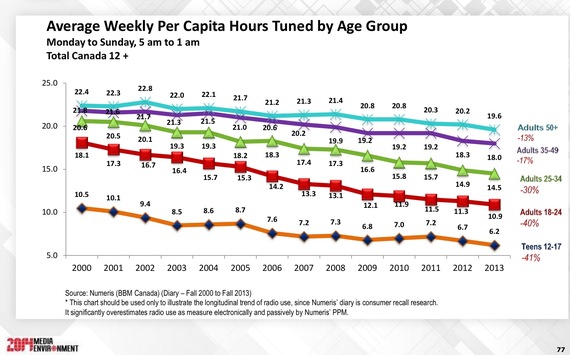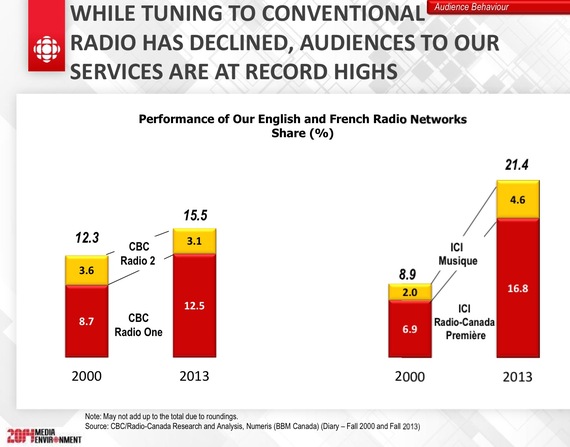
The Jian Ghomeshi and Evan Soloman scandals signal that CBC managers have lost control of CBC. The Corporation has resorted to hiring an outside labour lawyer to investigate what went wrong with management processes, an admission of failure. But the signs of trouble have been there for some time.
CBC is a relative bargain. In 2014 Canadians paid on average only $18 per capita in public monies to fund CBC Radio and TV, a tiny fraction of what they spent on other TV-related services, such as cable TV or Netflix. (We paid only $11 per person to fund Radio Canada.) We also pay smaller amounts for CBC specialty channels, such as CBC News Network ,and CBC benefits from other, smaller government funds.
The finger-pointing for CBC's problems has become a national pastime but its roots are fairly obvious.
For over a decade CBC Presidents, who, along with the CBC Board of Directors, are appointed by the government, have hired outsiders to manage CBC English Radio and TV. Hubert Lacroix, the current President admitted when he accepted the job he knew very little about the CBC. For the President to in turn rely on outsiders to manage the programming services is a departure from a long practice of relying on staff who came up through CBC ranks to become vice-presidents. This is proving disastrous as the CBC once again has suffered government funding cuts and is trying to maximize other revenues. But it is evident to me that the current senior management team knows very little about the organization they are in charge of, the result of broken management systems and practices. The Ghomeshi scandal is the tip of the iceberg.
Some other examples:
Some other examples:
- CBC senior managers have recently given three different estimates of CBC's commercial revenue, including advertising. Which is it? The difference amounts to about $300 million. How can one budget properly without knowing?
- Hubert Lacroix asserted recently that TV advertising revenue accounts for 93% of "business revenue." According to CBC's annual report he is off the mark by 30 percentage points.
- Mr. Lacroix should know but he has been busy with extracurricular activities. While President of CBC he has been a director of several private companies, one of which paid him almost $100,000 in 2011. He's been so busy he misread the policy on travel and inadvertently billed the CBC for $30,000 in ineligible travel expenses.
- Ad revenue currently accounts for about 30% of CBC TV's total revenue, substantially less than 15 years ago, yet the President has claimed it was between "40% and 50%." Have senior managers lost track of tens of millions of dollars?
- For years CBC managers boasted that NHL hockey was a profit centre. Yet, after CBC lost the NHL rights to Rogers, the CBC President admitted that at best hockey broke even. What kinds of decisions are made with such conflicting information?
- The President told the CRTC that CBC Radio would be protected from further cuts but CRTC data reveal that cuts to radio continued and radio's annual budget is $100 million less today, which may be in violation of the Broadcasting Act.
- CBC says it has cut over 2,100 staff in recent years. But CRTC data reveal that the staff reductions are about a third of the number claimed (most are in radio). Do senior managers monitor staffing?
- Journalistic policies are being ignored by those in the trenches. There is evidence that policy on expressing opinion is being violated, most notably by Rex Murphy. Mr. Murphy and others have been criticized for accepting large fees for public appearances, even from charities such as the Salvation Army. This has not always been the case for CBC-branded celebrities. Is the lack of management oversight the cause?
- Despite overall TV viewing levels at all time highs and CBC radio audience shares at modern-day record levels, CBC managers have announced that they are planning on making murky, new "digital" services a higher priority than radio and TV! The new digital strategy comes with no business plan, no estimates of costs or revenues. Is this simply an invention of managers with little broadcasting experience?
Is it surprising that CBC is in such crisis?
The last decade has taken a toll. The President and the majority of his Board are supporters of the Conservative party, which seems to have handcuffed efforts to fight for funding from a government they personally fund. Ironically, they don't seem to know that the majority of the Conservative "base" also support CBC.
The result is acquiescence in government cuts and a reluctance to make the case for new sources of revenue. The best they can come up with is to cut staff and then rent out the space once occupied by the departed.
If you wanted to slowly strangle the CBC, you couldn't imagine more ideal circumstances. With a stacked Board of Directors and senior management team so inexperienced in TV/radio programming, how could they possibly make the case for CBC? The first step to righting the ship is to put in place an experienced captain and crew.
(A version of this post first appeared in Huffington Post)



